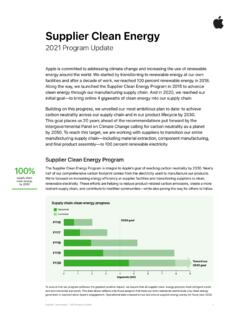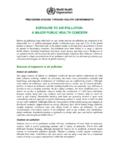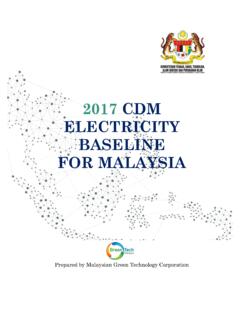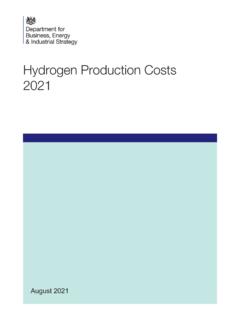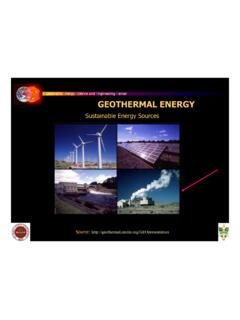Transcription of Advanced Thermal Treatment of Municipal Solid Waste
1 Advanced Thermal Treatment of Municipal Solid Waste February 2013 Originally prepared on behalf of Defra as part of the New Technologies Supporter Programme, 2004 2007, and updated by Frith Resource Management (FRM) in 2012. We acknowledge support from the Department for Environment, Food & Rural Affairs (Defra), the Department of Communities & Local Government (DCLG), the Environment Agency (EA), the Department of Energy and Climate Change (DECC), and the contractors (acknowledged in the body of the report) in the preparation of this update . This Document has been produced on behalf of Defra to provide assistance to Local Authorities and the Waste management market generally through awareness rising of the key Municipal Waste management options for the diversion of residual Municipal Waste from landfill.
2 The Document has been developed in good faith by the Advisors on behalf of Defra, and neither Defra nor its Advisers shall incur any liability for any action or omission arising out of any reliance being placed on the Document by any Local Authority or organisation or other person. Any Local Authority or organisation or other person in receipt of this Document should take their own legal, financial and other relevant professional advice when considering what action (if any) to take in respect of any Waste strategy, initiative, proposal, or other involvement with any Waste management option or technology , or before placing any reliance on anything contained therein.
3 Any interpretations of policy in this document are that of Frith Resource Management Limited and not of Defra, DECC, DCLG, or the Environment Agency. Crown copyright 2012 All rights reserved. You may re-use this information (not including logos) free of charge in any format or medium, under the terms of the Open Government Licence. To view this licence, visit or write to the Information Policy Team, The National Archives, Kew, London TW9 4DU, or e-mail: This document/publication is also available on our website at: Any enquiries regarding this document/publication should be sent to us at: Cover image courtesy of Energos, Group.
4 PB13888 Contents Preamble .. 1 1. Introduction .. 2 2. How It Works .. 3 3. Markets and Outlets for ATT Outputs .. 15 4. Track Record .. 19 5. Contractual and Financing Issues .. 21 6. Planning and Permitting Issues .. 25 7. Social and Perception Issues .. 35 8. Cost .. 37 9. Contribution to National Targets .. 38 10. Further Reading and Sources of Information .. 40 11. Glossary .. 1 Preamble This Waste Management technology Brief, originally produced in 2007, is one of a series of documents prepared under the New Technologies work stream of the Defra Waste Implementation Programme.
5 This Brief has been revised to accompany the 2013 Energy from Waste Guide while remaining a standalone document. The Briefs address the main technology types that have a role in diverting Municipal Solid Waste (MSW) from landfill. This Brief has been produced to provide an overview of Advanced Thermal Treatments which recover energy from MSW. Other titles in this revised series include:, Incineration of Municipal Solid Waste , Advanced Biological Treatment , Mechanical Biological Treatment , Mechanical Heat Treatment . The prime audience for these Briefs are local authorities, in particular Waste management officers, members and other key decision makers for MSW management in England but also members of the public who require more detailed information on the technologies mentioned in the 2013 Energy from Waste Guide.
6 It should be noted that these documents are intended as guides to each generic technology area. These Briefs deal primarily with the Treatment and processing of residual MSW. 1 1. Introduction Residual Municipal Solid Waste (MSW) is Waste that is household or household like. It comprises household Waste collected by local authorities some commercial and industrial wastes from offices, schools, shops etc that may be collected by the local authority or a commercial company. Legislation limits (by implication1) the amount of mixed MSW that can be sent to landfill. One of the guiding principles, now enshrined in law, for European and UK Waste management has been the concept of a hierarchy of Waste management options, where the most desirable option is not to produce the Waste in the first place ( Waste prevention) and the least desirable option is to dispose of the Waste to landfill with no recovery of either materials and/or energy.
7 Between these two extremes there are a wide variety of Waste Treatment options that may be used as part of a Waste management strategy to recover materials (for example furniture reuse, glass recycling or organic Waste composting) or generate energy from the wastes (for example through incineration, or digesting biodegradable wastes to produce usable gases). There are a wide variety of alternative Waste management options and strategies available for dealing with residual Municipal Solid Waste to limit the amount left for disposal to landfill. The aim of this guide is to provide impartial information about the range of technologies referred to as Advanced Thermal Treatment (ATT) the principle ones being gasification and pyrolysis.
8 These technologies are designed to recover energy (in the form of heat, electricity or fuel) and can contribute to the diversion of biodegradable Municipal Waste (BMW) from landfill. The technologies described in this Brief, Advanced Thermal Treatment , have a relatively limited track record in the UK (and a slightly greater track record internationally) on MSW. There are many examples of ATT processes that are established, viable and bankable on various Waste streams ( biomass , industrial wastes, tyres etc.) but a lesser number proven on Municipal wastes. The aim of this document is to raise awareness of the technologies available and help remove barriers to the development of appropriate ATT processes in England.
9 This guide is designed to be read in conjunction with the other Waste Management technology Briefs in this series. Other relevant sources of information are identified throughout the document. 1 Targets pertain to the biodegradable fraction in MSW. 2 2. How It Works This section comprises an overview of the principles of Advanced Thermal Treatment processes. Advanced Thermal Treatment Advanced Thermal Treatment technologies are primarily those that employ pyrolysis and/or gasification to process Municipal Solid Waste (MSW). It excludes incineration2 of wastes which is already a mature and well established technology .
10 The gasification and pyrolysis of Solid materials is not a new concept. It has been used extensively to produce fuels such as charcoal, coke and town or producer gas. Charcoal and coke are produced by pyrolysing wood and coal respectively and producer gas is a combustible gas produced by the gasification of coke in the presence of air and steam. It is only in relatively recent years that such pyrolysis and gasification have been commercially applied to the Treatment of MSW. The development of pyrolysis and gasification technologies for commercial and prepared Municipal Waste is becoming established for some technologies in the UK, whereas other technology configurations are still at the pilot / early development stages.











